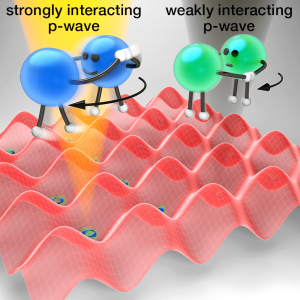Unitary p-wave interactions between fermions in an optical lattice
| Author | |
|---|---|
| Abstract |
Exchange-antisymmetric pair wavefunctions in fermionic systems can give rise to unconventional superconductors and superfluids. The realization of these states in controllable quantum systems, such as ultracold gases, could enable new types of quantum simulations, topological quantum gates and exotic few-body states. However, p-wave and other antisymmetric interactions are weak in naturally occurring systems, and their enhancement via Feshbach resonances in ultracold systems has been limited by three-body loss. |
| Year of Publication |
2023
|
| Date Published |
2023-01
|
| Journal Title |
Nature
|
| Volume |
613
|
| Start Page or Article ID |
262–267
|
| DOI | |
| Download citation | |
| JILA PI | |
| Related JILA Highlights | |
| Associated Institutes | |
Journal Article
|
|
| JILA Topics | |
| Publication Status | |
| Publication Image |

|


 The Physics Frontiers Centers (PFC) program supports university-based centers and institutes where the collective efforts of a larger group of individuals can enable transformational advances in the most promising research areas. The program is designed to foster major breakthroughs at the intellectual frontiers of physics by providing needed resources such as combinations of talents, skills, disciplines, and/or specialized infrastructure, not usually available to individual investigators or small groups, in an environment in which the collective efforts of the larger group can be shown to be seminal to promoting significant progress in the science and the education of students. PFCs also include creative, substantive activities aimed at enhancing education, broadening participation of traditionally underrepresented groups, and outreach to the scientific community and general public.
The Physics Frontiers Centers (PFC) program supports university-based centers and institutes where the collective efforts of a larger group of individuals can enable transformational advances in the most promising research areas. The program is designed to foster major breakthroughs at the intellectual frontiers of physics by providing needed resources such as combinations of talents, skills, disciplines, and/or specialized infrastructure, not usually available to individual investigators or small groups, in an environment in which the collective efforts of the larger group can be shown to be seminal to promoting significant progress in the science and the education of students. PFCs also include creative, substantive activities aimed at enhancing education, broadening participation of traditionally underrepresented groups, and outreach to the scientific community and general public.